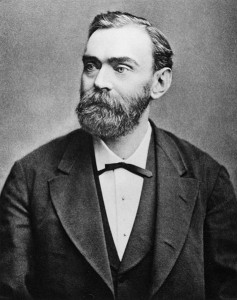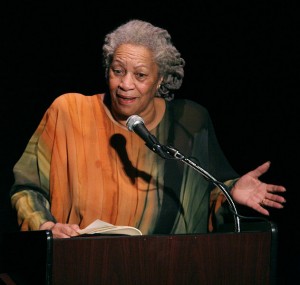Alfred Nobel

Alfred Nobel was born in Stockholm, Sweden, in 1833. In 1842, the Nobel family moved to Russia, where Alfred and his brothers received an education in the humanities and the natural sciences from private tutors. Nobel is accredited with the invention of dynamite in 1866. Dynamite and the blasting cap are two of Nobel’s most well known inventions, and he held 355 patents. Second to his reputation as an inventor is Nobel’s reputation as a businessman; he established businesses and laboratories in over twenty countries. Nobel was not only interested in the sciences but he seriously considered becoming a writer, choosing to write poetry, drama, and even an unfinished novel in his leisure time. Nobel sought conciseness in language, and he was a gifted writer of aphorisms.
On November 27, 1895, Alfred Nobel signed his final will and testament. In his will, Nobel established the Nobel Foundation, which awards prizes in Physics, Peace, Literature, Chemistry, and Physiology or Medicine. Nobel was explicit in his instructions that the prize should go to the person or persons who made the greatest contribution to mankind through their field, regardless of nationality. Nobel died of a heart attack in San Remo, Italy on December 10, 1896, just over a year after signing his will. The first Nobel Prize was awarded in 1901. In 1968, the Bank of Sweden created the “Bank of Sweden Prize in Economic Sciences in Memory of Alfred Nobel,” sometimes referred to as the Nobel Prize in Economics.
The Swedish Academy
King Gustaf III founded the Swedish Academy on April 5th, 1786. It is very similar to the French Academy. In his inaugural speech upon the formation of the Swedish Academy, Gustaf III announced its main purpose to preserve the ‘purity, vigour and majesty’ of the Swedish language. To accomplish its goal, the Academy was charged with the production of a Swedish dictionary and rules regarding not only grammar, but proper behavior as well. Gustaf III created the Academy to serve a patriotic purpose as well, each year commemorating one Swede of remarkable achievement. At the turn of the twentieth century, the Academy assumed the task of awarding the Nobel Prize in Literature, which was not a part of its original statutes.
The Nomination and Selection Process of the Prize in Literature
Every year the Swedish Academy sends requests for nominations of candidates for the Nobel Prize in Literature. Members of the Academy, members of academies and societies of similar membership and goals, professors of literature and language, former Nobel laureates in literature, and the presidents of writers’ organizations representing their countries’ literary productions are allowed to nominate a candidate. It is not possible to nominate oneself.
Thousands of requests are sent out each year, and about fifty proposals are made. A proposal does not need to be accompanied by supporting reasons, but it can be. Proposals must be received by the academy by February 1st, and the proposals are examined by the Nobel Committee throughout the spring. By April, the Academy narrows the field to around twenty candidates, and by summer the list is usually reduced to five names. In October, the members of the Academy vote, and the candidate who gains more than half the number of votes is named the Nobel Laureate in Literature.
The Prize
In Stockholm on December 10, His Majesty the King awards the prizes during the Prize Award Ceremony. The Peace Prize is awarded on the same day in Oslo by the Chairman of the Norwegian Nobel Committee in the presence of the King of Norway. The winner of the Nobel Prize in his or her field receives a diploma, a medal, and a document certifying the prize amount. The prize amount is the same for every field. It can be awarded to one person or team, split between two or three individuals, or allocated to the Main fund or Special fund for that field.
The institution that awards the prize in a given field determines the design of the diploma for that field. The Royal Swedish Academy of Sciences awards the prizes in Physics, Chemistry, and Economics. The Nobel Assembly at the Karolinska Institute is responsible for the Physiology or Medicine Prize, the Swedish Academy for the Prize in Literature, and the Norwegian Nobel Committee for presentation of the Peace Prize. The diplomas have varied over the years, depending on the field and the artist. Today, each diploma is a unique creation.
The Nobel medals each bear on one side a portrait of Alfred Nobel. The other side bears an inscription and an image appropriate to the laureate’s field. The designs of the medals have remained unchanged since 1902. Until 1980, the medals were made of 23 karat gold. Since then, they have been made of 18 karat green gold plated with 24 karat gold. In addition to the diploma, medal, and prize amount, every Nobel laureate since 1961 has been commemorated with an annual series of stamps issued by the Sweden Post Stamps.
Nobel Laureates in Literature since 1945
- 2017 Kazuo Ishiguro
- 2016 Bob Dylan
- 2015 Svetlana Alexievich
- 2014 Patrick Modiano
- 2013 Alice Munro
- 2012 Mo Yan
- 2011 Tomas Tranströmer
- 2010 Mario Vargas Llosa
- 2009 Herta Müller
- 2008 Jean-Marie Gustave Le Clézio
- 2007 Doris Lessing
- 2006 Orhan Pamuk
- 2005 Harold Pinter
- 2004 Elfriede Jelinek
- 2003 John M. Coetzee
- 2002 Imre Kertész
- 2001 Sir Vidiadhar Surajprasad Naipaul
-

Toni Morrison, 1993 Nobel recipient/CC Licensed 2001 2000 Gao Xingjian, France (born in China)
- 1999 Günter Grass, Germany
- 1998 José Saramago, Portugal
- 1997 Dario Fo, Italy
- 1996 Wislawa Szymborska, Poland
- 1995 Seamus Heaney, Ireland
- 1994 Kenzaburo Oe, Japan
- 1993 Toni Morrison, USA
- 1992 Derek Walcott, St. Lucia
- 1991 Nadine Gordimer, South Africa
- 1990 Octavio Paz, Mexico
- 1989 Camilo José Cela, Spain
- 1988 Naguib Mahfouz, Egypt
- 1987 Joseph Brodsky, USA (born in the Soviet Union)
- 1986 Wole Soyinka, Nigeria
- 1985 Claude Simon, France
- 1984 Jaroslav Seifert, Czechoslovakia
- 1983 William Golding, Great Britain
- 1982 Gabriel García Márquez, Colombia
- 1981 Elias Canetti, Great Britain (born in Bulgaria)
- 1980 Czeslaw Milosz, USA and Poland
- 1979 Odysseus Elytis, Greece
- 1978 Isaac Bashevis Singer, USA (born in Poland)
- 1977 Vicente Aleixandre, Spain
- 1976 Saul Bellow, USA
- 1975 Eugenio Montale, Italy
- 1974 Eyvind Johnson, Sweden/ Harry Martinson, Sweden
- 1973 Patrick White, Australia
- 1972 Heinrich Böll, Germany
- 1971 Pablo Neruda, Chile
- 1970 Aleksandr Solzhenitsyn, Soviet Union
- 1969 Samuel Beckett, Ireland
- 1968 Kawabata Yasunari, Japan
- 1967 Miguel Angel Asturias, Guatemala
- 1966 Samuel Agnon, Israel/ Nelly Sachs, Sweden (born in Germany)
- 1965 Mikhail Sholokhov, Soviet Union
- 1964 Jean-Paul Sartre, France
- 1963 Giorgos Seferis, Greece
- 1962 John Steinbeck, USA
- 1961 Ivo Andric, Yugoslavia
- 1960 Saint-John Perse, France
- 1959 Salvatore Quasimodo, Italy
- 1958 Boris Pasternak, Soviet Union
- 1957 Albert Camus, France
- 1956 Juan Ramón Jiménez, Spain
- 1955 Halldór Kiljan Laxness, Iceland
- 1954 Ernest Hemingway, USA
- 1953 Winston Churchill, Great Britain
- 1952 François Mauriac, France
- 1951 Pär Lagerkvist, Sweden
- 1950 Bertrand Russell, Great Britain
- 1949 William Faulkner, USA
- 1948 Thomas Stearns Eliot, Great Britain
- 1947 André Gide, France
- 1946 Hermann Hesse, Switzerland (born in Germany)
- 1945 Gabriela Mistral, Chile
Full list of all winners from 1901 available at http://www.nobel.se/literature/laureates/index.html
Controversy Surrounding the Nobel Prize in Literature
Since the establishment of the Nobel prize in literature, it has been surrounded by a great deal of controversy. In his will, Nobel was clear that the prize was to be given to the author of “the most astounding work in an ideal direction.” There has been much debate as to what, exactly, Nobel meant in this statement. What constitutes an “astounding” work is highly subjective, as is the vague requirement that the work move “in an ideal direction.” It is this last ambiguity that has been the source of much debate over the years. Some people have argued that Nobel meant idealistic, and not ideal, which is an entirely different concept. As Kjell Espmark writes, “Indeed, the history of the literature prize is in some ways a series of attempts to interpret an imprecisely worded will.” The selection of the first Nobel laureate in literature, Sully Prudhomme, was attacked by August Strindberg in 1910. Strindberg argued that Prudhomme’s writing was not written ideally because “he was a materialist and had translated Lucretius” (Allen).
Works Cited
- Allen, Sture. “Topping Shakespeare? Aspects of the Nobel Prize in Literature”. (July 23, 1997) Web. 19 November, 2001. <http://www.nobelprize.org/nobel_prizes/literature/articles/sture/index.html>
- Espmark, Kjell. “The Nobel Prize in Literature”. (Dec, 1999) Web. 19 November 2001. <http://www.nobelprize.org/nobel_prizes/literature/articles/espmark/index.html>
- The Nobel Foundation. “The Nobel e-Museum” (2001) Web. 31 October 2001.<http://www.nobelprize.org/>
- The Swedish Academy. “Swedish Academy (English)” (Dec, 2000) Web. 31 October 2001.
Related Sites
Alfred Nobel’s Aphorisms
http://www.nobelprize.org/alfred_nobel/biographical/aphorisms.html
Excerpt from Alfred Nobel’s Will Creating the Nobel Prize
http://www.nobelprize.org/alfred_nobel/will/
The Nobel Prize in Literature Medal
http://www.nobelprize.org/nobel_prizes/literature/medal.html
Nobel Prize Amounts, 1901 to 2001
http://www.nobelprize.org/nobel_prizes/about/amounts.html
Postcolonial Author and 1913 Nobel Laureate Rabindranath Tagore
http://www.nobelprize.org/nobel_prizes/literature/laureates/1913/#
Nadine Gordimer and the South African Experience
http://www.nobelprize.org/nobel_prizes/literature/laureates/1991/#
A Single, Homeless, Circling Satellite: Derek Walcott, 1992 Nobel Literature Laureate
http://www.nobelprize.org/nobel_prizes/literature/laureates/1992/
Author: Carey Coombs, Fall 2001
Last edited: October 2017